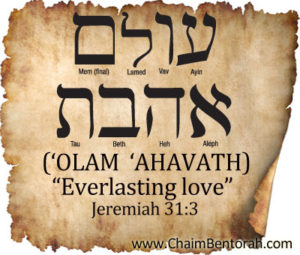HEBREW WORD STUDY – EVERLASTING LOVE – ‘OLAM ‘AHAVATH
Jeremiah 31:3 “The LORD hath appeared of old unto me, saying, Yea, I have loved thee with an everlasting love: therefore with lovingkindness have I drawn thee.”
 “Never to make a line I have not heard in my own heart.” – Edmond Rostand, Cyrano de Bergerac
“Never to make a line I have not heard in my own heart.” – Edmond Rostand, Cyrano de Bergerac
What I find curious about this passage is the word “saying” is not in the text. Why that is important is that there are two words that could have been us for saying, davar and ‘amar. Now, most of our English Christian translators would not consider this important and really make no distinction between devar and ‘amar. The Jewish sages, however, do. Did God speak this from his heart – devar, or was it just casual conversation – ‘amar? I believe Scripture does not use either word because it wants to express the idea that God’s love for us is the same in casual conversation and when He speaks from His heart. Say a husband is unfaithful and he is trying to reconnect with his wife after this betrayal. He will ask: “Do you love me?” She might say yes, but her heart may be saying no.” In this verse God is putting no limits or conditions to His love for us, he loves us devar and ‘amar, when we are loving to Him and when we betray that love and even break His heart, His love never changes.
Note how He describes His love. How does He love us? With an olam ‘ahavath – everlasting love. Interesting that He uses the word ‘ahav and not recham for love. Racham is a natural love like a mother has for a child in her womb. That child did nothing to earn that love, it is just natural. ‘Ahav is a love that is growing and changing. To modify it with the word ‘olam – eternal is an amazing expression. You see the word ‘olam means eternal but eternal in the sense that of being hidden. Its Semitic origins lie in the word hide and conceal. It eventually took on the meaning of eternal as eternal has the idea of a future, present, and past. We can really only know the present. Our knowledge of the past becomes subjective. Did George Washington chop down a cherry tree? Most historians say no, some still cling to the idea he did, the fact is, there is no way to be certain, even if we find a written record of it, how do we know it was not embellished by the writer? The true past is conceal. The future is also hidden for obvious reasons. From that was birthed the use of this word ‘olam as everlasting.
I have been on a ten-year journey to discover God’s heart. I have learned this. You see His heart flows with love, but it is a love that is constantly growing. What a minute, isn’t His love perfect, that is complete? Yes, but the depths of that love are also ‘olam, everlasting but concealed. God cannot express the depths of His love until we respond to Him in love. The more we love Him, the more he can unconceal, reveal the depths of His love. The love in God’s heart is there but we have to mine His heart for it. In fact, we will spend an eternity mining God ’s heart and discover new depths of His love and the crazy thing is, it is everlasting, there is no end to the depth of His love to discover. We will spend eternity growing deeper and deeper in experiencing His love. For you see it is an everlasting love. Not only a love that will not end but a love with depths that will take an eternity to discover.







Recent Comments